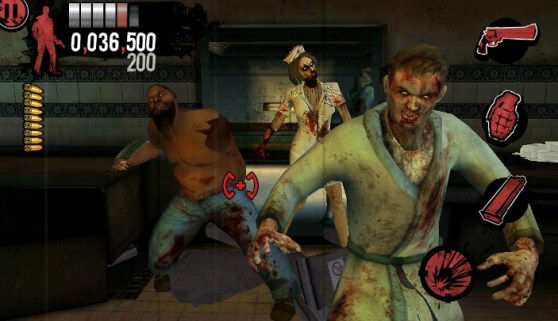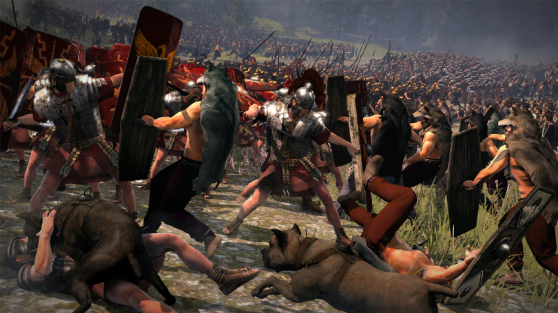GamesBeat: Do you worry about some sort of brand-identity crisis, where consumers may be unsure of what type of publisher Sega is? As you guys just said, you have your super hardcore strategy titles. You have your adult, violent titles. You have totally kid-friendly casual experiences. Does this lineup confuse the market a little bit?
Evans: I think it’s up to us to have very defined brands and very defined campaigns. If you’re mixing the message up in your marketing campaigns, then you’re risking the chance of confusing consumers, but I don’t think we do that in the approach that we have with our marketing.
Einhorn: Stepping a couple of years back, we had strategic conversations about exactly that. An interesting analogy that came up at the time was that Warner Bros., for instance, is the studio that does Bugs Bunny and The Exorcist. Those can comfortable coexist under the same umbrella. It’s about delivering high-quality products to consumers. Sega means different things to different consumers.
Evans: We have studios that have their own identity within Sega as well. You have your Creative Assembly making a Total War product, which is very defined and very well respected in that space. Then you have the Football Manager brand, as well, from Sports Interactive. They both exist within that sphere. You have the Sonic products as well. We have Three Rings, which we bought back in 2011, making their kind of games. They all exist under the Sega umbrella, but they all have their own identities and brands and communities associated with them.

Above: The House of the Dead: Overkill — The Lost Reels (iOS, Android)
GamesBeat: Some of these Sega brands — let’s take Sonic, for example — must be difficult to market. It’s family-friendly and perhaps casual, but at the same time, maybe it resonates more with guys who grew up in the 16-bit days versus kids now. How do you deal with those challenges?
Einhorn: I think what that creates for us with Sonic is a great opportunity. First and foremost, I am a father who grew up with the Sonic games. I was in high school when it came out. I have a 6-year-old now, and one of the great pleasures for me is to be able to share something I loved with my kids. So you have that father-child dynamic.
Kids also respond very strongly to Sonic on their own, without any parental support. I think part of that is that he’s like a superhero. He’s fast. He’s blue. He’s easy to understand. There’s a broad range, as you know, of people who love Sonic, but the age of 7 to 11 is absolutely the strongest in terms of loving Sonic. But then, as you said, we also have the older gamer who’s nostalgic, and that’s why we have products like Sonic Generations that are designed specifically for them. It gives us more opportunities to capitalize on the strengths of an iconic franchise.
GamesBeat: Can you talk about the difficulty of being a traditional console publisher transitioning to mobile and digital? You hear a lot of the success stories in the mobile and digital space, but they don’t seem like they’re coming from the big console guys. EA, Ubisoft, Activision, you guys … you all want to get into mobile and digital, but it’s those mobile-first companies that seem to have more success and more of the share of the headlines.
Evans: I think it’s fair to say that Sega’s had a good degree of success in the space. Maybe we don’t get quite so much press sometimes, compared to when you have a breakout hit by a small indie developer. We started working with Apple in 2008. We had some great success with the first Super Monkey Ball.
It’s a fascinating space to operate in, and it’s changing so quickly. Just when I think we’re starting to get a handle on it, the business models are changing all the time.
Einhorn: We’ve had some incredible high points in our time in the mobile space. As Mike said, we did Super Monkey Ball at the launch of the App Store, and that was actually the first No. 1 product in the App Store. For the first two weeks, it was No. 1. Beyond that, we’d done incredibly well with Sonic, the original Genesis Sonic the Hedgehog, in the feature phone space.

Above: Total War: Rome II (PC)
Evans: What I’m pleased about is [the recent] Pocket Gamer Awards. Sonic CD won the award for the best Windows mobile game. Sega won the overall publisher award. I’m really excited that we are still seen as somebody who is constantly evolving. We’re able to win awards as voted on by the consumers, which is a great place for us to be.
Einhorn: Our relationship with Apple is very strong. They’ve been quite generous to us. They’ve been providing us with a lot of visibility in the App Store, which has been great.
Evans: We are constantly searching for new platforms and new opportunities within the mobile space as well. We’re not just limited to one major player. We’ve got 15 titles now over on Android. We’re working with Amazon. We’re working with Blackberry. There’s a number of other players who, as they come on, we’ll carry on working with as well.
GamesBeat: Atari co-founder Nolan Bushnell told All Things D that mobile is too crowded, saying he’d rather be one of 100 apps for a new platform like Google Glass than one of 300,000 mobile games that’s hard to find. How do deal with the challenges of discovery?
Evans: It’s a good point. We’re in a position where we believe we have game quality and pedigree. That helps. We have great relationships with first parties. We make sure we work with them on an ongoing basis. Where we see opportunity behind a product, we’re going to invest in that product to make sure we can leverage industry PR channels. We have a really good community that we’ve worked with over a number of years, to service them and bring product. That gives us plenty of advantages in this space. But that only because we’ve worked with them and nurtured that community over a period of time.
VentureBeat's mission is to be a digital town square for technical decision-makers to gain knowledge about transformative enterprise technology and transact. Learn More
